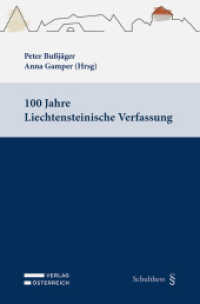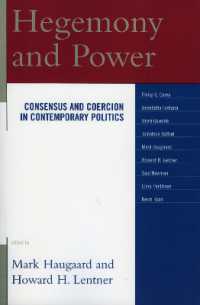- ホーム
- > 洋書
- > 英文書
- > Literary Criticism
Full Description
In Transversal Ecocritical Praxis: Theoretical Arguments, Literary Analysis, and Cultural Critique, Patrick D. Murphy, Ph.D, utilizes ecocriticism and ecofeminism to develop his concept of transversal practice: an interdisciplinary combination of theory and applied criticism. He begins by explaining the necessity for cutting across disciplinary boundaries of all kinds in order to address the ecological dimensions of culture and literature. The dialogical foundation of this orientation is elaborated through a consideration of the theories of Mikhail Bkahtin, particularly in terms of the ethical responsibilities of the reader and critic. Murphy then takes up issues of identity and subject formation in relation to genetics, embodiment, and selfhood. These same issues play out in the history of the aesthetic category of the sublime, which the author critiques from an ecofeminist perspective. Following that, he turns attention to cultural issues of consumption, both at home and internationally, looking particularly at postcolonial literature and forms of resistance to globalizations and agricultural land grabs. Resistance and postcolonial literature is further analyzed through consideration of two book-length Latin American poetic sequences, one by Pablo Neruda and the other by Ernesto Cardenal. Switching from works focused on the present, Murphy turns his attention then to how these themes play out in the future oriented worlds of science fiction. He concludes with two chapters that combine ecocriticial cultural critique and economic analysis in studies of the destructive role of megadams, particularly in Asia, and the impact of the combined threats of peak oil and climate change on one island's tourist economy. The conclusion contains a discussion of further drivers of future ecocritical analysis. Traversing a wide range of examples, literary, cultural and economic, this work fleshes out the benefits of an ethically grounded interdisciplinary ecocriticism.
Contents
Acknowledgments
Introduction: Unpacking the Terms of my Title and Outlining the Organization of my Text
Chapter One: Dialoguing with Bakhtin on Our Ethical Responsiblility to Anothers
Chapter Two: Furnishing the Study for Performing the Household by Resolving Static Cling: The Procession of Identity and Ecology in Contemporary Literature
Chapter Three: Subjects, Identities, Bodies, and Selves: Siblings, Symbiotes, and the Ecological Stakes of Self Perception
Chapter Four: An Ecological Feminist Revisioning of the Masculinist Sublime
Chapter Five: Consumption as Addiction, Sustainability as Recovery
Chapter Six: Community Resilience and the Cosmopolitan Role in Environmental Challenge-Response Novels
Chapter Seven: The Poetic Politics of Ecological Inhabitation in Neruda's Canto General, and Cardenal's Cosmic Canticle
Chapter Eight: The Dilemma of Terraforming in Three Parts
Chapter Nine: Damning Damming Modernity: The Destructive Role of Megadams
Chapter Ten: Preparing on the Plateau of Peak Oil
Chapter Eleven: Conclusion
Works Cited







